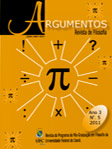Discourse ethics: foundation and relationship between Morals and Law
Keywords:
Ethics. Transzendentalpragmatik. Apel. Responsibility. Law.Abstract
This paper investigates the Apelian reconstruction of the controversy between Habermas and Apel own, about the reasons and the relation between morality and law, while procedural conception of discursive of practical philosophy. So the objective is to show the relationship - methodologically important - of philosophical discourse in the specific treatment to the architectural discourse ethics. It supports the hypothesis that the debate and controversy between the two programs of ethical discourse derive from the fundamentally different way to develop the theme the relationship between metodological set out the philosophical and socio-recontructive sciences, empirical, and that is the difference in approach is relevant in a different way of addressing the moral and devise the concept of practical reason, which culminates in the understanding of practical reason as moral or non-prescription and the problem of your unit and / or how much of your specification. For Apel, it is important to determine this relationship as methodologically from that reflection effect will, in theory discursive division between two fundamental ways of thinking about the reasons and the relation between moral law and the police. Apel considers fundamental thing that Habermas does not accept, make the case that in view pragmatic- linguistic-metadiscourse is a philosophy that is relevant to the differentiation of the normative dimensions of practical reason.Downloads
Published
Issue
Section
License
Argumentos magazine is licensed under an International Creative Commons Attribution License.
The Magazine uses CC BY inclusion
1) The authors retain the copyright granted to the magazine or the right to initial publication, with the work regularly licensed under the Creative Commons Attribution, which allows the sharing of the work with acknowledgment of authorship and initial publication in this magazine.
2) The authors are authorized to contract additional applicable contracts, for non-exclusive distribution of the version of the work published in this journal (for example, publication in the institutional repository or as a chapter of the book), recognition of authorship and initial publication in this journal.
3) Authors are authorized and encourage to publish and distribute their work online (for example, in institutional repositories or on their personal pages) at any time before or during the editorial process, as they can generate productive changes, as well as increase the impact and reference of published work.




.jpg)










._._3.png)
1.jpg)
._._._.png)
